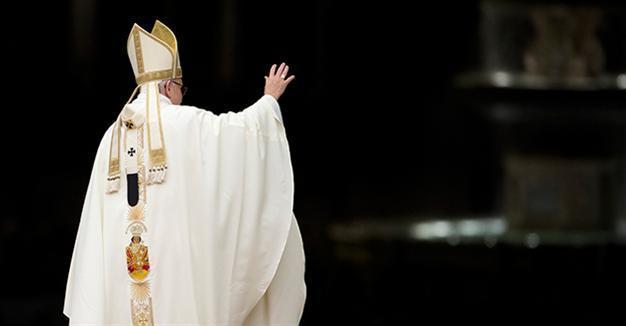Turkey to send back envoy to Vatican after ‘rewording’ on 1915 incidents
ANKARA

Pope Francis greets nuns and priests, in St. Peter's Square, at the Vatican, Tuesday, Feb. 2, 2016. AP Photo
Turkey has announced a decision to return its ambassador to the Vatican, Mehmet Paçacı, nearly 10 months after withdrawing him in protest at Pope Francis’ description of the killings of Anatolian Armenians during World War I as “the first genocide of the 20th century.”
A statement by the Turkish Foreign Ministry released late on Feb. 3 referred to a statement that was delivered earlier on Feb. 3 by the Vatican Press Office. In the statement, the Vatican appreciated Turkey’s 2005 proposal to Armenia to establish a joint historical commission to investigate the 1915 killings of Anatolian Armenians during the Ottoman era while also denouncing violence in reference to the 1977 killing of Turkish Ambassador to the Vatican Taha Carım, who was assassinated by members of the Armenian Secret Army for the Liberation of Armenia (ASALA), the Turkish Foreign Ministry said.
“Within this framework, a decision has been made to return our Vatican ambassador, Mehmet Paçacı, who has been in the headquarters for consultations since a mass held in Saint Peter’s Basilica on April 12, 2015, to his office,” said the statement, which came in the form of an answer to a journalist’s question concerning the Vatican Press Office’s statement.
Turkey says it shares the pain of Armenians over the events but has vehemently rejected the use of the term genocide, contending that hundreds of thousands of Muslims and Christians were killed on both sides in a wartime tragedy.
Pope Francis sparked a diplomatic row in April 2015, calling the massacre of up to 1.5 million Armenians 100 years ago “the first genocide of the 20th century.”
In its statement paving the way for Ankara’s move, the Vatican announced that Rinaldo Marmara, the spokesperson for the Episcopal Conference of Turkey, presented to Pope Francis a copy of his book “La Squadra Pontificia ai Dardanelli 1657 / İlk Çanakkale Zaferі 1657” (“First Gallipoli Victory 1657”) at the conclusion of the General Audience on Feb. 3.
“The book, notwithstanding the painful memories of history, illustrates the importance of scholarly research and opening up archives to historical investigation in the service of truth and building bridges of cooperation and mutual understanding. In light of this, the repeated commitment of Turkey to make its archives available to historians and researchers of interested parties in order to arrive jointly at a better understanding of historical events and the pain and suffering endured by all parties, regardless of their religious or ethnic identity, caught up in war and conflict, including the tragic events of 1915, is noted and appreciated. The painful events of history should not be forgotten; instead they require careful examination and reflection so that they may lead to the healing and purification of memory so necessary for reconciliation and forgiveness for individuals and peoples, as St. John Paul II affirmed,” the Vatican said.
“The memory of the suffering and pain of both the distant and the more recent past, as in the case of the assassination of Taha Carım, ambassador of Turkey to the Holy See, in June 1977, at the hands of a terrorist group, urges us also to acknowledge the suffering of the present and to condemn all acts of violence and terrorism, which continue to cause victims today,” the Vatican also said.
